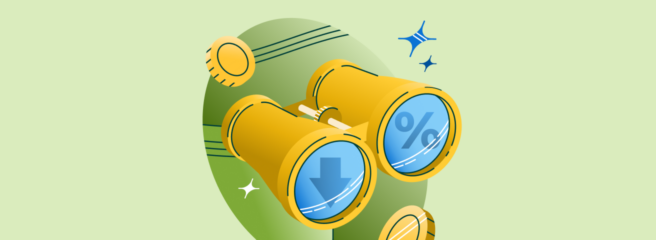
Have you noticed that the items on your weekly shopping list have gone up in price? How about the cost to fill up your gas tank? The surge in prices that you’re witnessing may be due to inflation.
In the simplest terms, inflation is the increase in prices you pay for goods and services. So you’ll have to pay more for the same things. Inflation isn’t necessarily good or bad. In fact, some inflation can be a sign that the economy is healthy.
However, in recent months, your wallet may be feeling a bit squeezed due to the rapid increase of inflation. In April 2022, consumer prices increased 8.3% compared to the year prior, according to the Department of Labor. While that’s .2% lower than the 8.5% rate reported in March 2022, it makes for six straight months of inflation rising at a pace not seen since the 1980s.
As rates continue to fluctuate, it’s important to think about how the rise in costs is impacting your wallet.
Inflation and purchasing power
Purchasing power, also known as buying power, indicates how much you can buy with your money. When inflation increases and prices for consumer goods rise, you lose purchasing power. Similarly, when inflation and prices decrease, consumers gain purchasing power.
Since inflation is currently high, it’s significantly decreasing the average person’s purchasing power. However, you may not be “average.” The impact of inflation on one person’s wallet may not be the same for the next since we all buy different products and services. To gauge how inflation is impacting your wallet, you need to calculate your personal inflation rate.
How to calculate inflation rate
Your personal inflation rate may be quite different compared to the national averages being reported. Your personal inflation rate depends on what you buy, where you shop, and where you live.
You can get a better understanding of your personal inflation rate by plugging your costs into a spreadsheet and doing some basic math. Here’s how you can calculate your personal interest rate:
- Create expense categories: To find out exactly what to include, review the U.S. Bureau of Labor Statistics’ list of expenses used in the consumer price index (CPI).
- Review your bills and statements: Collect your credit card bills and bank statements from April 2021 and April 2022 to understand how much you spent in each category.
- Total it: Add up your total expenses for April 2021 and for April 2022.
- Find the difference: Subtract your total spending for April 2021 from April 2022.
- Divide it: Divide the difference by the total number of your monthly expenses from April 2021. The result is your personal inflation rate.
How to combat inflation
While the Federal Reserve works to raise interest rates to help balance out inflation, here are the best ways to beat inflation and protect your finances.
1. Update your budget
If you’re still relying on your budget from last year, check it and make some changes. Review your budget and compare it to your current expenses. Prioritize necessities when making your financial goals. Then, think about where you can cut costs.
Pro tip: If you have a loan or debt with high interest rates, consider refinancing your loan or consolidating your debt for possibly lower rates.
2. Shop strategically
An increase in inflation doesn’t mean you have to stop spending money; you just need to be mindful of higher costs. A good way to combat higher prices is to comparison shop. To avoid driving to several stores to find the best deals, use digital tools. You can use an app like GasBuddy to help you find the best gas prices near you. For groceries, you can use online tools like Basket to help you find the best deals.
Additionally, consider shifting what you buy from items that are highly impacted by inflation, to items that have escaped the worst of it. For instance, your grocery bill may have gone up, but a lot of the price increases are tied to rising prices for animal-derived products. Try embracing a more plant-based diet or opting for meat that hasn’t been as impacted by inflation.
3. Get a high-yield savings account
Everyone needs an emergency fund. A great place to store your savings as inflation rises is in a high-yield savings account. This type of account can help you grow your money more than a regular savings or checking account. Also, since the Fed is raising interest rates to help balance inflation, it means your savings account will yield higher returns. Even though the gains from this type of account won’t outpace inflation, it can help.
4. Increase your active and passive income
Since your paycheck may not be going as far as it used to before inflation, you need to increase your earnings. You can do so by increasing your active and passive income streams.
To increase your active income, consider asking for a raise. Your employer may be willing to negotiate since inflation erodes the living wage and they’ll want to keep talent. If you don’t feel comfortable asking for a raise, consider leveraging your skills for a side hustle.
Additionally, consider ways you can set up a passive income stream. For example, if you have a spare room or storage space you can rent them out for some extra cash with minimal effort.
5. Review your investments
If you’re an investor, it’s important to check in with your financial advisor when inflation increases. Your advisor will be able to help ensure that you have the right investment allocation to match your comfort level with risk. By diversifying your portfolio with different types of assets, you can better protect your investments.
Next steps on inflation and your wallet
Inflation can be overwhelming, especially since it can impact almost every part of your financial life. However, it’s essential to avoid panic and focus on what you can control, like your budget. Review your spending habits along with your budget and adjust spending where necessary. That way, you can keep your financial goals on track and prepare for the unexpected in case inflation persists.






 Won't affect your credit score¹
Won't affect your credit score¹